Maintaining strong customer relationships is the key to unlocking success in the current business scenario. As businesses strive to connect with their customers on a deeper level, managing customer interactions and data becomes paramount. That’s where Best CRM Software in 2023 comes into play, empowering businesses to streamline their operations, nurture customer relationships, and drive overall growth.
Businesses need to stay ahead of the curve by leveraging the most effective Best CRM software available. That’s why we have curated a comprehensive list of the Best CRM software options for 2023, carefully selected based on their cutting-edge features, user-friendly interfaces, and proven track records of delivering tangible results.
With our expertly curated list, you can unlock your business’s full potential and propel it toward unparalleled success. Whether you’re a small startup aiming to establish a solid customer base or an established enterprise seeking to optimize your customer interactions, this list will provide you with the insights you need to make an informed decision and drive your business forward.
“The true power of CRM software lies not in its technological capabilities alone, but in how effectively it enables businesses to forge meaningful connections with their customers and cultivate lasting relationships.” – John Smith, CRM Industry Expert
We understand that choosing the right Best CRM software is no easy task, considering the multitude of options available in the market. However, our meticulous research and analysis have narrowed down the choices to present you with the cream of the crop. By incorporating the best CRM software into your business strategy, you can enhance efficiency, boost productivity, and ultimately, forge stronger and more profitable relationships with your customers.
Continue reading this blog to delve into the world of CRM software and uncover the industry’s most powerful and innovative solutions. Let us guide you toward finding your business’s true potential with our carefully curated list of the Best CRM software in 2023. It’s time to take your business to new heights and establish a lasting competitive advantage in today’s dynamic marketplace. Let’s get started!
What Is CRM: Understanding a Fresh Perspective on Building Customer Relationships
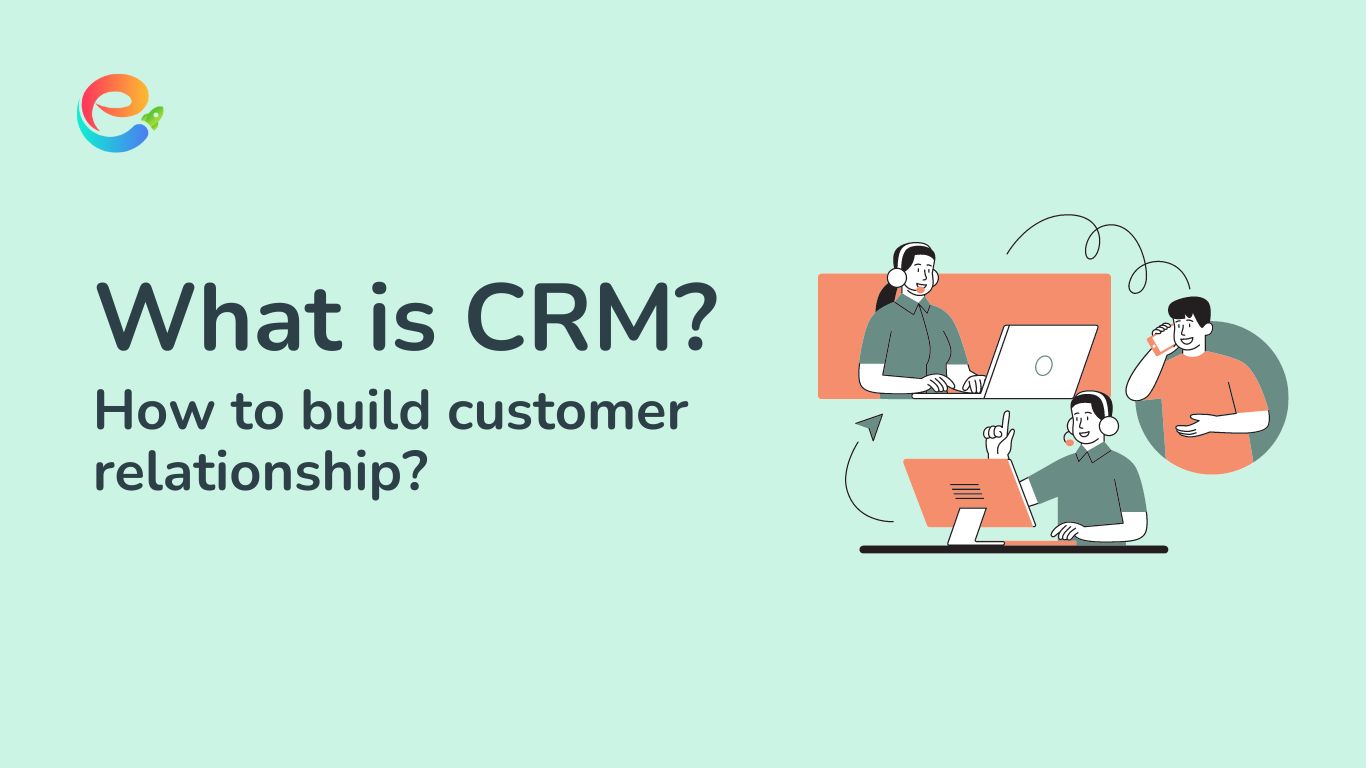
Imagine running a business where every interaction with your customers is personalized, meaningful, and memorable. A place where you not only know their names but also understand their preferences, needs, and desires. That’s the power of Customer Relationship Management or CRM – a philosophy that brings the human touch back to the heart of business.
CRM is about more than technology or data management at its core. It’s about building genuine connections with your customers, understanding their stories, and nurturing long-lasting relationships. It’s about treating every customer as a unique individual and tailoring your products, services, and interactions to meet their specific needs.
The best example that can reflect the magic of CRM in action is – a customer calls your support line, and instead of being treated like a nameless face in a queue, they are greeted warmly by a representative who knows their history, understands their concerns, and genuinely cares about resolving their issue. This clearly shows how CRM transforms ordinary transactions into extraordinary experiences.
With CRM, you have the tools and strategies to gather valuable customer information, such as their preferences, purchase history, and communication preferences. But it’s not just about the data; it’s about the insights you gain from it. By analyzing this information, you can uncover patterns, identify trends, and anticipate your customers’ needs before they even express them.
But always remember that Best CRM software is not just about technology. It’s a mindset, a commitment to putting the human element back into the business. It’s about listening attentively, responding empathetically, and going the extra mile to exceed your customers’ expectations. It’s about creating a positive emotional connection that transcends transactions and fosters loyalty.
The Best CRM Software of 2023
1. EQUP: Best for Sales & Marketing Automation and Omnichannel Communication
2. PipeDrive: Best for Visual Sales Pipelines
3. Freshsales: Best for Communications
4. HubSpot CRM: Best for Integrations
5. Zoho: Best for Remote and Hybrid Teams
6. Keap: Best for Ease of Use
7. Act-On: Best for Marketing Automation
8. MailChimp: Best for Email Marketing
9. Active Campaign: Best for Sales Automation
10. SalesMate: Best for Sales Automation
Discover Your Perfect Best CRM Software in 2023: In-Depth Reviews to Guide Your Decision
1. EQUP
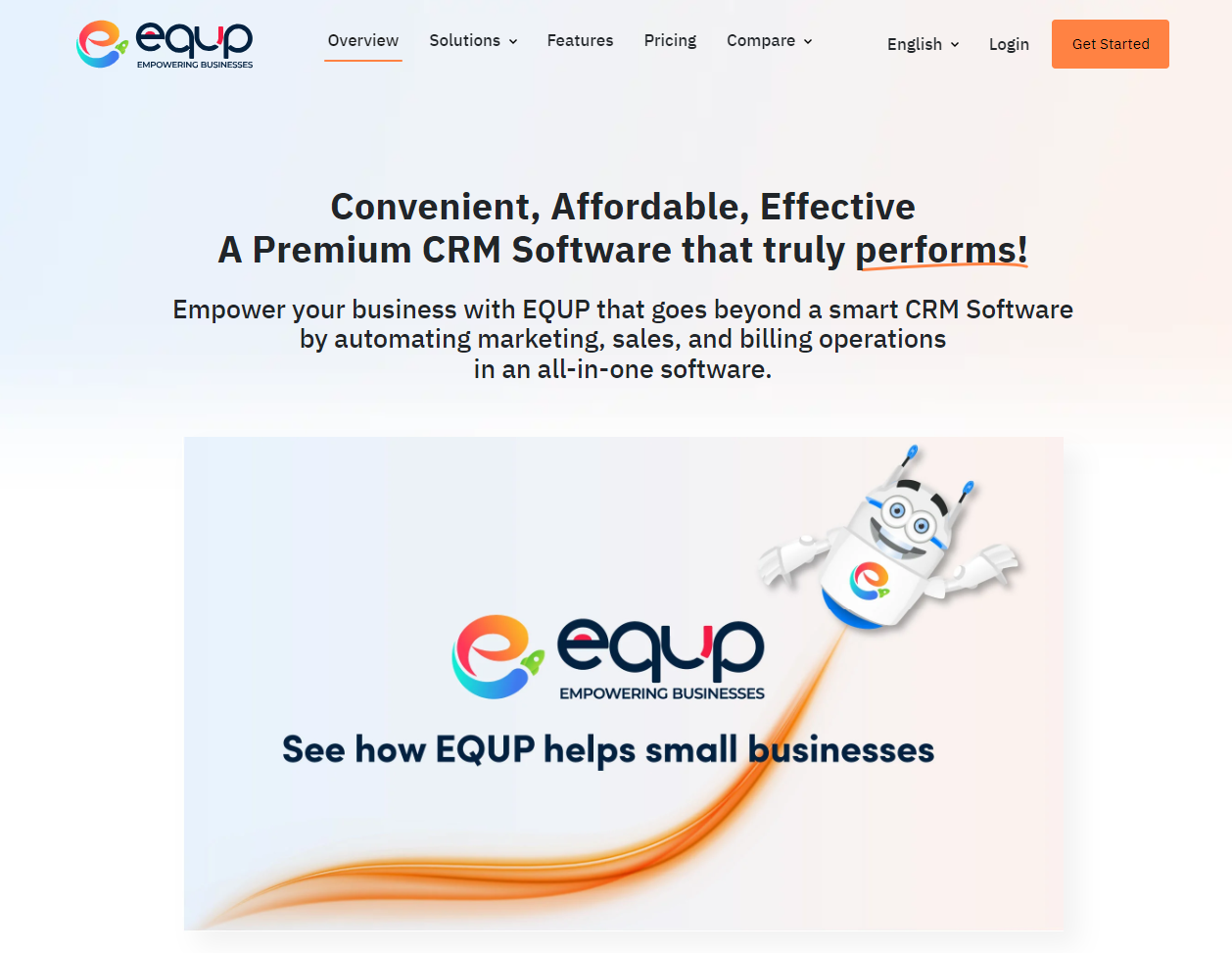
EQUP is an all-in-one CRM software that offers comprehensive tools and features to help businesses manage their customer relationships, sales processes, and marketing efforts. It provides a centralized platform where businesses can efficiently handle their customer data, streamline their sales pipeline, and automate various aspects of their customer engagement strategies.
EQUP follows a holistic approach and combines features such as contact management, lead tracking, sales automation, and marketing automation into a single platform. This integration allows businesses to have a 360-degree view of their customers, enabling them to better understand their needs, preferences, and behaviors. EQUP’s contact management feature enables businesses to store and organize customer information, while the lead tracking functionality helps track and nurture leads through the sales pipeline.
It also offers robust automation capabilities, allowing businesses to automate repetitive tasks, such as sending personalized email campaigns, following up with prospects, or triggering actions based on specific customer behaviors or events. This automation helps save time, improve efficiency, and ensure consistent communication with customers and prospects. Moreover, EQUP provides marketing automation features that enable businesses to create targeted campaigns, track campaign performance, and measure the effectiveness of their marketing efforts.
In addition to the above features, EQUP offers billing and invoicing automation, landing page and form builder, and bookings & appointment features that can give you an into several business aspects. Email marketing campaign building and management with customizable reporting and analytics tools provide valuable insights into campaign performance, customer responses, and marketing ROI. These insights help businesses make data-driven decisions, identify areas for improvement, and optimize their strategies.
Key Features of EQUP
- Centralized customer data management
- Streamlined sales pipeline tracking
- Automation of repetitive tasks
- Enhanced customer engagement
- Integrated marketing automation
- Customizable reporting and analytics
- Efficient lead tracking and nurturing
- Improved sales team collaboration
- Integration with third-party applications
- Time-saving features
- Enhanced productivity and efficiency
- Data-driven decision-making
Key Challenges with EQUP
- Direct integration with apps is not possible, despite having API and webhooks for seamless integrations.
- Limited integration options with other software and tools.
- Software is new, but keeps adding new features, and has a responsive team.
- Unable to create custom reports as of now.
2. HubSpot
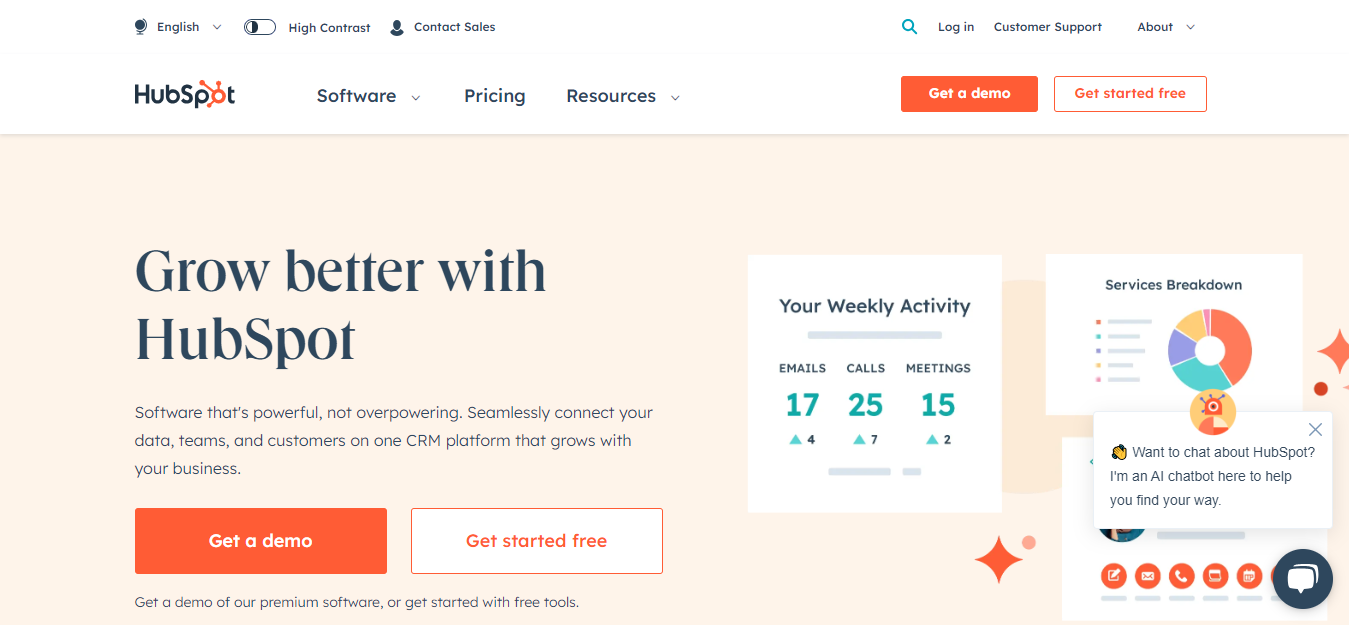
When it comes to enhancing sales team performance and streamlining data management, HubSpot’s Operations Hub stands out as a top-notch solution. With a wide array of integration capabilities, this robust platform enables sales teams to centralize data from multiple software providers, resulting in improved efficiency and productivity.
One of the key features of HubSpot is its seamless integration with third-party tools, allowing for easy connection and synchronization of customer data. By automating essential business processes, the platform empowers teams to work more efficiently and effectively. With all your software platforms integrated, HubSpot provides comprehensive tracking of sales funnel metrics, activity insights, and productivity, giving you a holistic view of your sales activities.
HubSpot’s integrations play a vital role in centralizing lead information. Regardless of the platform used for communication, every interaction with a lead is neatly stored in a unified timeline. This ensures that you and your team can effortlessly pick up where conversations left off, regardless of who last engaged with the lead. By syncing with popular email providers like Gmail and Outlook, as well as social media platforms, HubSpot captures every customer interaction, making it effortless to track, analyze, and utilize this valuable information.
Key Features of HubSpot
- Seamless Integration
- Third-Party Tool Connectivity
- Sales Funnel Metrics
- Centralized Lead Information
- Email and Social Media Integration
Key Challenges with HubSpot
- Limited Advanced Customization Options
- Steeper Learning Curve for Advanced Features
- Potential for High Costs with Additional HubSpot Tools and Features
- Reliance on HubSpot Ecosystem for Comprehensive Functionality
- Complexity in Managing Large Datasets
- Limited Phone Support in Certain Subscription Tiers
3. PipeDrive
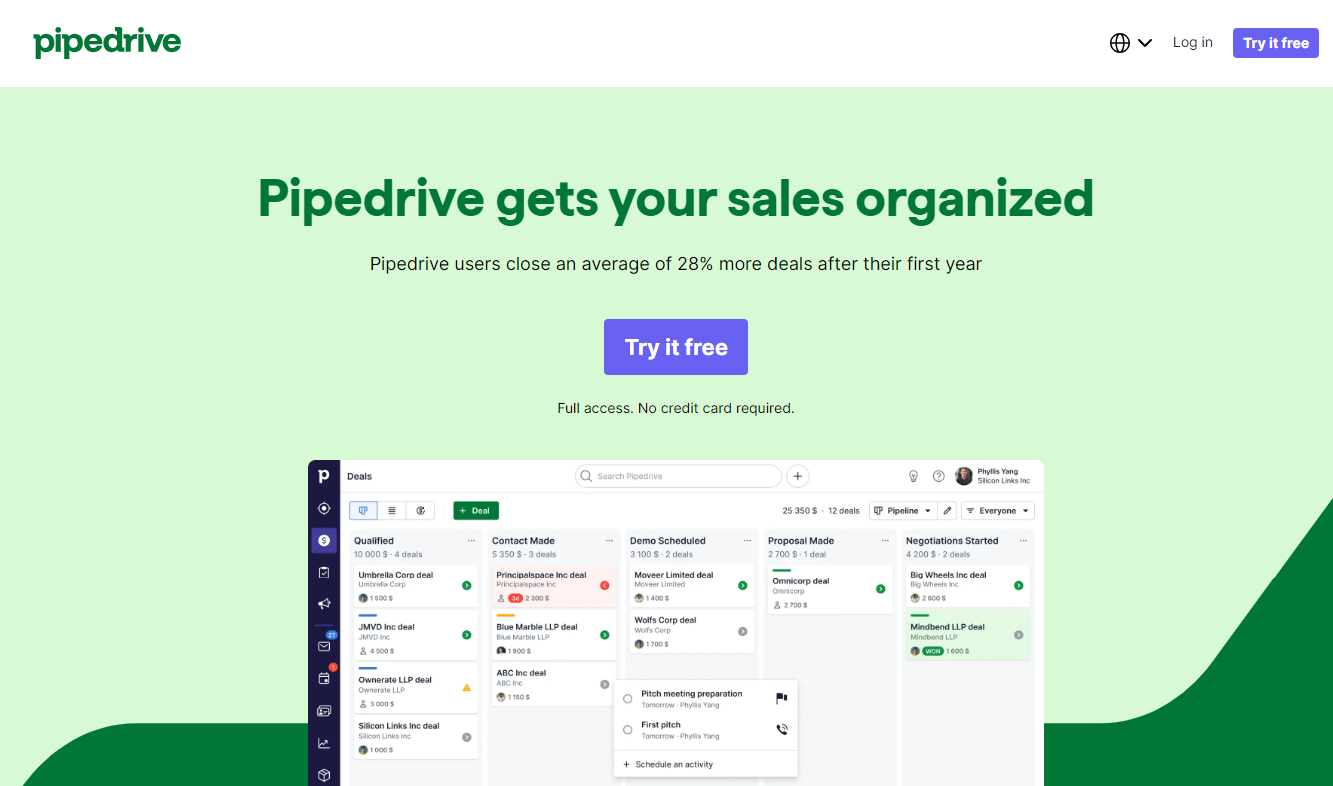
When it comes to businesses seeking a robust CRM solution that offers a powerful visual sales pipeline, Pipedrive stands out as an exceptional choice. With its user-friendly interface and comprehensive data visualizations, Pipedrive empowers teams to gain valuable insights and make informed decisions effortlessly.
One of the standout features of Pipedrive is its intuitive visual tools, which provide a clear and concise overview of each opportunity. This allows team members to understand the status of deals at a glance, enabling them to prioritize tasks and respond promptly to mission-critical activities highlighted on the dashboard. The drag-and-drop functionality further enhances the flexibility and ease of use, allowing for seamless navigation and efficient collaboration.
Also, customizability is a key strength of Pipedrive, as it allows businesses to tailor pipelines and fields according to their unique workflow systems. By optimizing existing processes across departments, organizations can streamline operations and ensure smooth information flow. This adaptability ensures that Pipedrive seamlessly integrates into your business environment, enhancing productivity and efficiency.
Key Features of PipeDrive
- Powerful visual sales pipeline
- Drag-and-drop interface
- Customizable pipelines and fields
- Easy setup and user-friendly interface
- Workflow automation and communication tracking
- Native messaging inbox
Key Challenges with PipeDrive
- Limited advanced automation features.
- Lack of built-in email marketing functionality.
- Higher pricing compared to some competitors.
- Some users have reported occasional bugs or glitches.
4. FreshSales
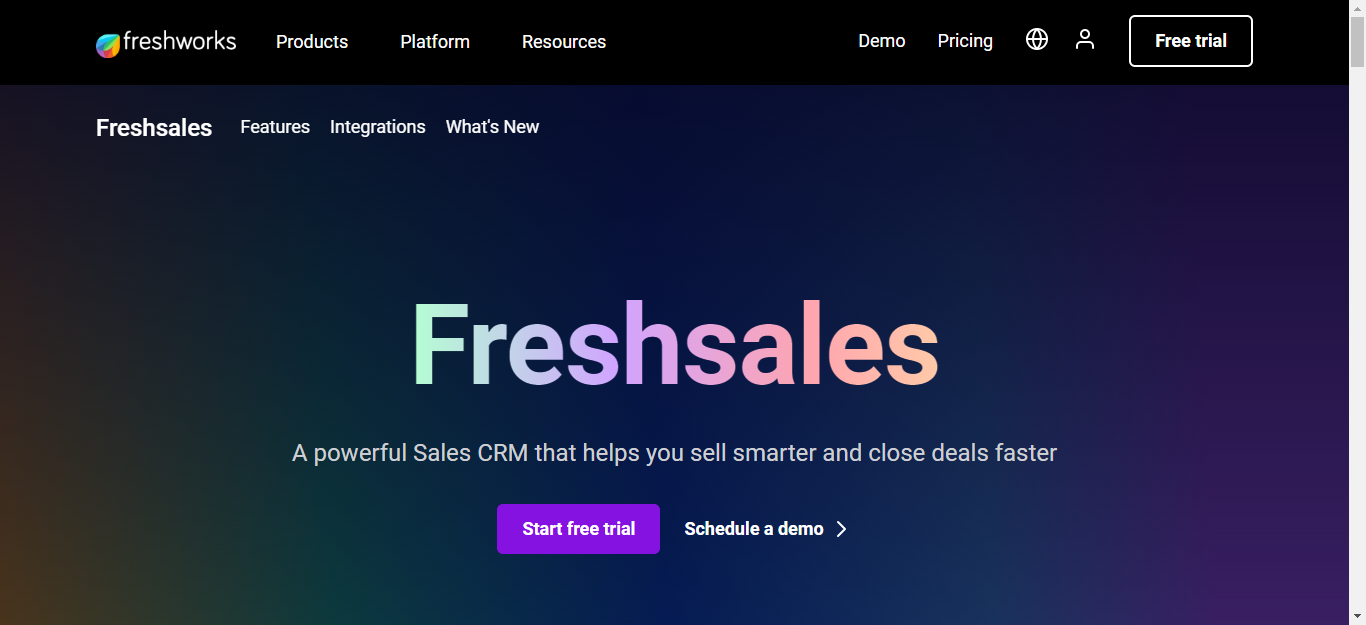
Freshsales CRM software stands out as a versatile and user-friendly solution that goes beyond traditional customer relationship management. It offers a range of built-in tools aimed at optimizing communications and gaining deeper insights into customer behaviors.
One of the standout features of Freshsales is its powerful AI assistant, Freddy. This intelligent assistant leverages historical sales data, activities, and customer engagement to provide valuable insights. By analyzing this information, Freddy helps you develop a comprehensive understanding of your customers, allowing for more personalized and effective interactions.
Freshsales also offers a basic built-in VoIP phone service with toll-free local numbers that can be purchased in over 90 countries. It also allows you to streamline your processes by setting up pipelines, workflows, and forecasting tools. These tools empower you to better understand your customers’ needs and preferences, enabling you to deliver targeted products and services that resonate with them.
Businesses can run personalized bulk email marketing campaigns, tailoring their communications to individual recipients. By managing deals and predicting their performance, they can gain valuable insights into your sales pipeline, allowing for more accurate revenue forecasting. Additionally, the system is designed to identify stagnant or unproductive deals, helping you focus your efforts on high-potential opportunities.
Key Features of FreshSales
- Intuitive and adaptable CRM software.
- Built-in VoIP phone service with toll-free local numbers.
- Pipelines, workflows, and forecasting tools.
- Personalized bulk email marketing campaigns.
- Deal management and performance prediction.
- Revenue forecasting capabilities.
- Ability to reawaken cold leads.
Key Challenges with FreshSales
- Limited customization options.
- Integration capabilities with other software are limited.
- Advanced automation features are lacking.
- Higher pricing compared to some competitors.
- Some users have reported occasional performance issues.
- Lack of built-in social media integration.
5. Zoho
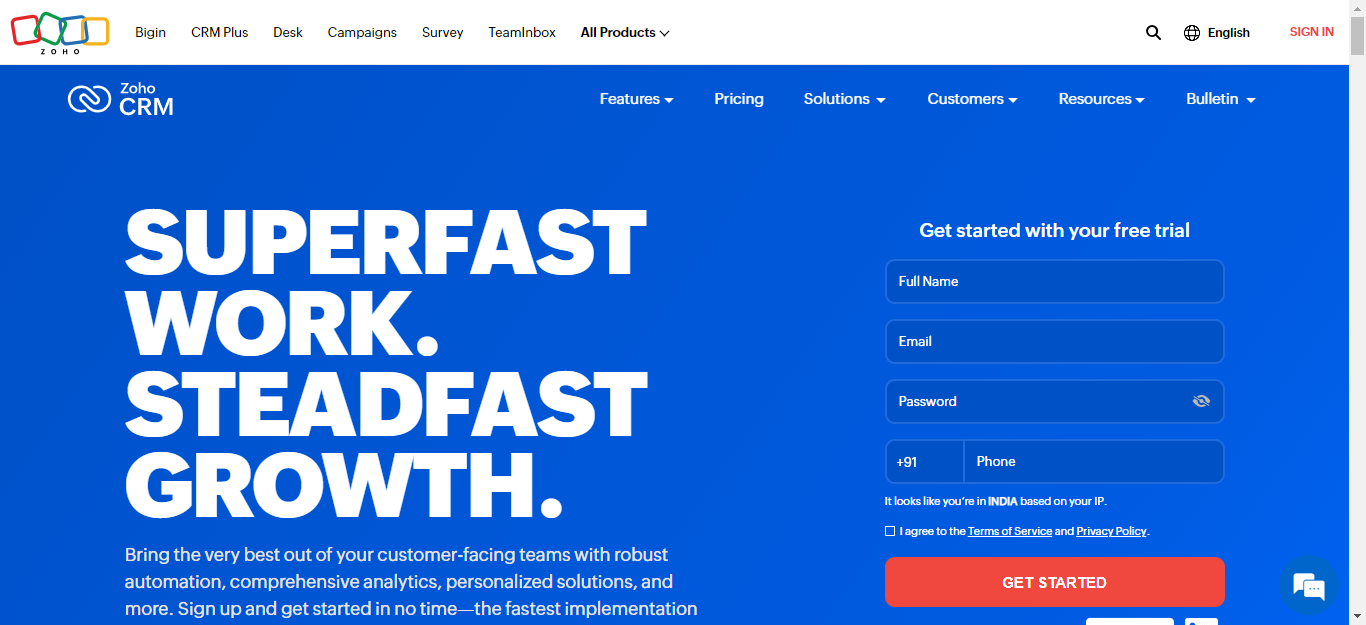
In an era where remote workforces are becoming increasingly prevalent, Zoho CRM stands out as a robust solution that enables teams to collaborate seamlessly, regardless of their locations. Designed to boost leads, accelerate sales, and provide accurate performance measurements, Zoho CRM offers ease and efficiency in achieving sales objectives.
Zoho offers gamification features, making it an appealing choice for remote workforces. By transforming every lead, call, and deal into a trophy, Zoho CRM fosters a competitive and encouraging sales atmosphere, irrespective of where team members are located. This gamified approach motivates and engages sales professionals, driving performance and enhancing team dynamics.
With hundreds of available integrations and a flexible dashboard, businesses can tailor the CRM to their specific needs and preferences. Zoho CRM offers additional powerful tools to enhance sales effectiveness. One such tool is SalesSignals, which tracks customer interactions across various channels and promptly notifies team members of valuable and time-sensitive potential leads. This enables sales professionals to act swiftly, capitalizing on opportunities and maximizing conversion rates.
Key Features of Zoho
- AI-powered assistant (Zia) for predictive insights and guidance.
- Gamification features foster a competitive sales atmosphere.
- Feeds notification module for universal updates and information sharing.
- SalesSignals for tracking customer interactions and identifying potential leads.
- Remote workforce capabilities for seamless collaboration.
Key Challenges with Zoho
- The steeper learning curve for new users.
- Occasional inconsistencies in user interface design.
- Higher pricing tiers for access to advanced functionalities.
- Complexity in managing large amounts of data within the CRM.
- Some users have reported occasional system slowdowns or performance issues.
6. Keap
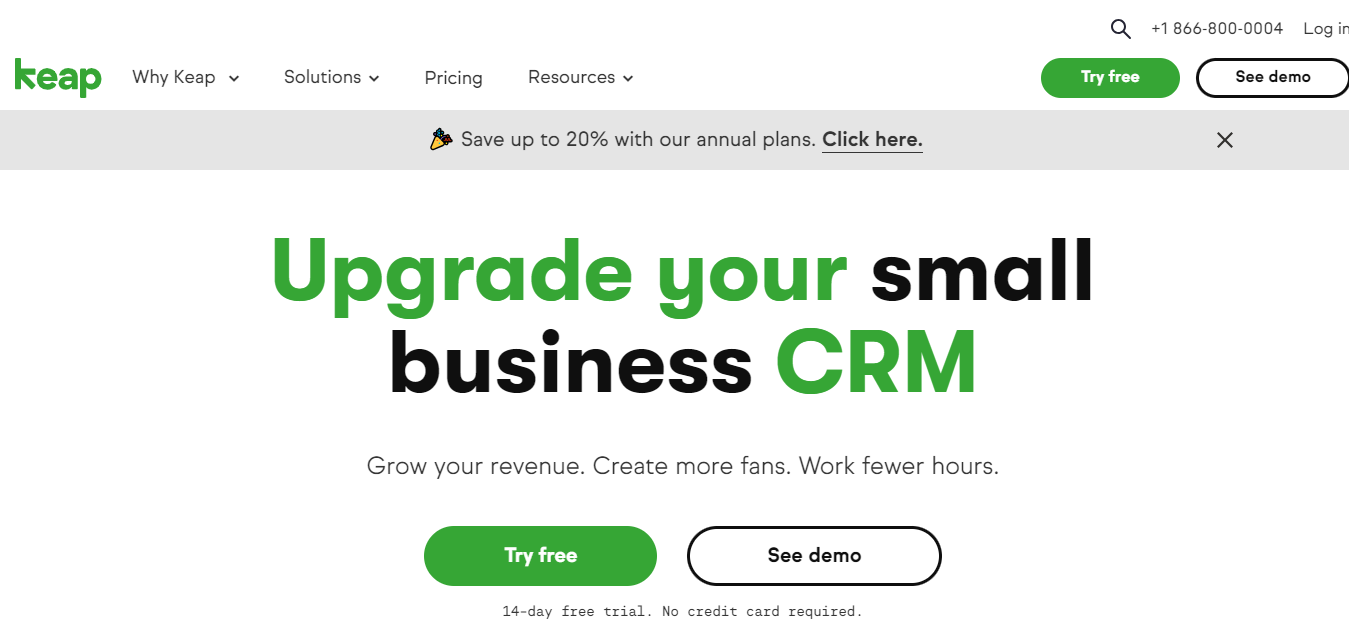
Keap is a highly appealing CRM tool, especially for businesses venturing into CRM software for the first time. With its intuitive user interface and straightforward setup process, Keap ensures that users can quickly adapt to the system without the need for extensive CRM expertise.
At the core of Keap’s offering is its CRM platform, which centralizes customer activity and interactions in a single location. This comprehensive approach enables businesses to efficiently track customer interactions, bolster sales efforts, and provide seamless support. With just a click from the dashboard, team members can easily text, email, schedule appointments, process purchases, and generate invoices.
Keap’s strength lies in its ability to automate contact management, consolidating activities from various platforms. By automatically capturing and organizing customer interactions, Keap streamlines workflows and enables businesses to focus on building relationships and driving sales.
It also offers premade and customizable templates for new pipelines. These templates, coupled with informative video guides, empower users to maximize the software’s capabilities without requiring any coding experience.
Key Features of Keap
- User-friendly interface
- Simple setup process
- Seamless communication via text and email
- Appointment scheduling capabilities
- Purchase processing and invoice generation
- Automated contact management
- Pre-made and customizable pipeline templates
Key Challenges with Keap
- Limited customization options compared to some competitors.
- The pricing structure may be less flexible for businesses with specific needs.
- Mobile app functionality and user experience need improvement.
- Occasional performance issues or system slowdowns are reported by some users.
- Limited scalability for larger businesses with complex CRM requirements.
- Some users have found the user interface design is less modern or visually appealing.
7. Act-On
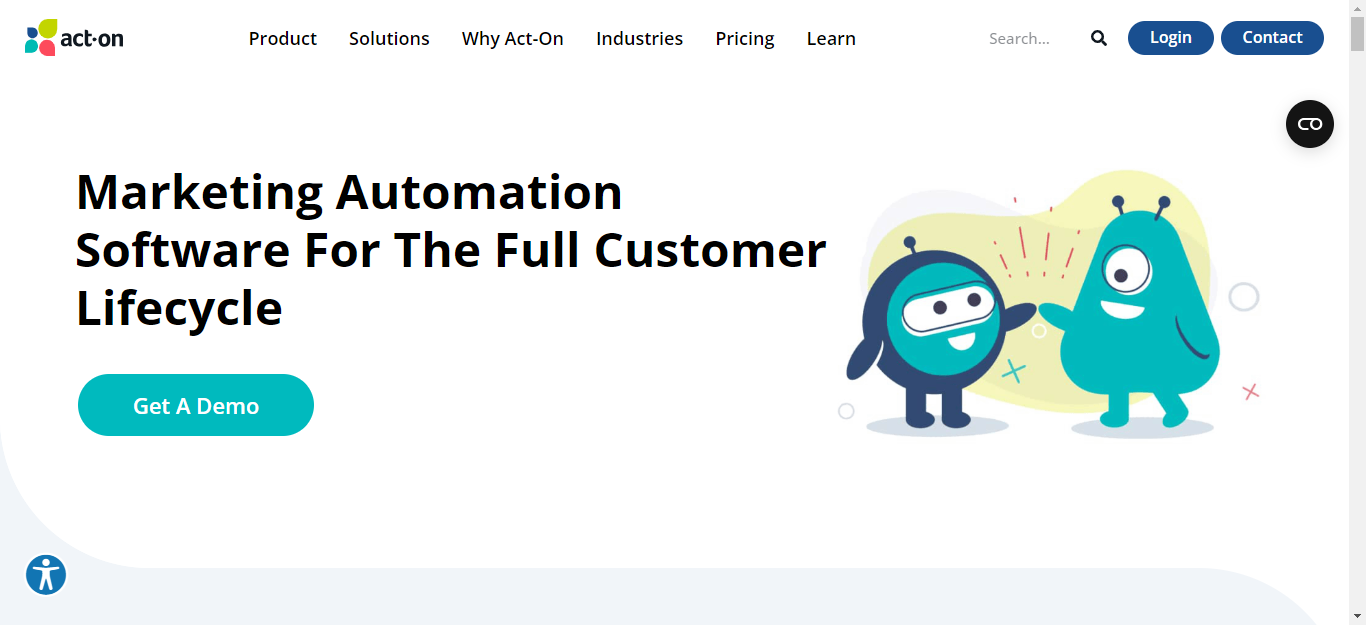
Act-On is a comprehensive Best CRM Software designed to help businesses effectively manage their customer interactions and streamline their sales and marketing processes. With Act-On, organizations can track and organize customer data, nurture leads, automate marketing campaigns, and gain valuable insights into customer behavior and preferences.
It offers a wide range of features and tools that enable businesses to enhance their customer engagement and drive revenue growth. These include contact management, lead scoring, email marketing automation, social media integration, campaign analytics, and reporting. The platform enables businesses to create personalized and targeted marketing campaigns, track the success of their marketing efforts, and make data-driven decisions to optimize their sales and marketing strategies. With Act-On, businesses can effectively manage their customer relationships, increase customer satisfaction, and ultimately drive business growth.
In addition to its core CRM capabilities, Act-On also provides advanced marketing automation features that empower businesses to engage with their prospects and customers at every stage of the buyer’s journey. Users can create customized email campaigns, landing pages, and web forms to capture leads and nurture them with personalized content. The platform’s lead scoring functionality helps identify high-quality leads, allowing sales teams to prioritize their efforts and focus on the most promising opportunities.
Key Features of Act-On
- Contact management
- Lead scoring
- Email marketing automation
- Social media integration
- Marketing automation
- Lead capture through landing pages and web forms
- Integration with Salesforce and Microsoft Dynamics 365
Key Challenges with Act-On
- Limited customization options
- Integration complexities with certain CRM platforms
- Potential for data syncing issues
- Occasional system glitches or technical issues
- Pricing may be considered high for some businesses
- Lack of advanced features compared to some competitors
- Potential for email deliverability challenges
- Difficulty in managing large volumes of data or high contact lists
8. MailChimp
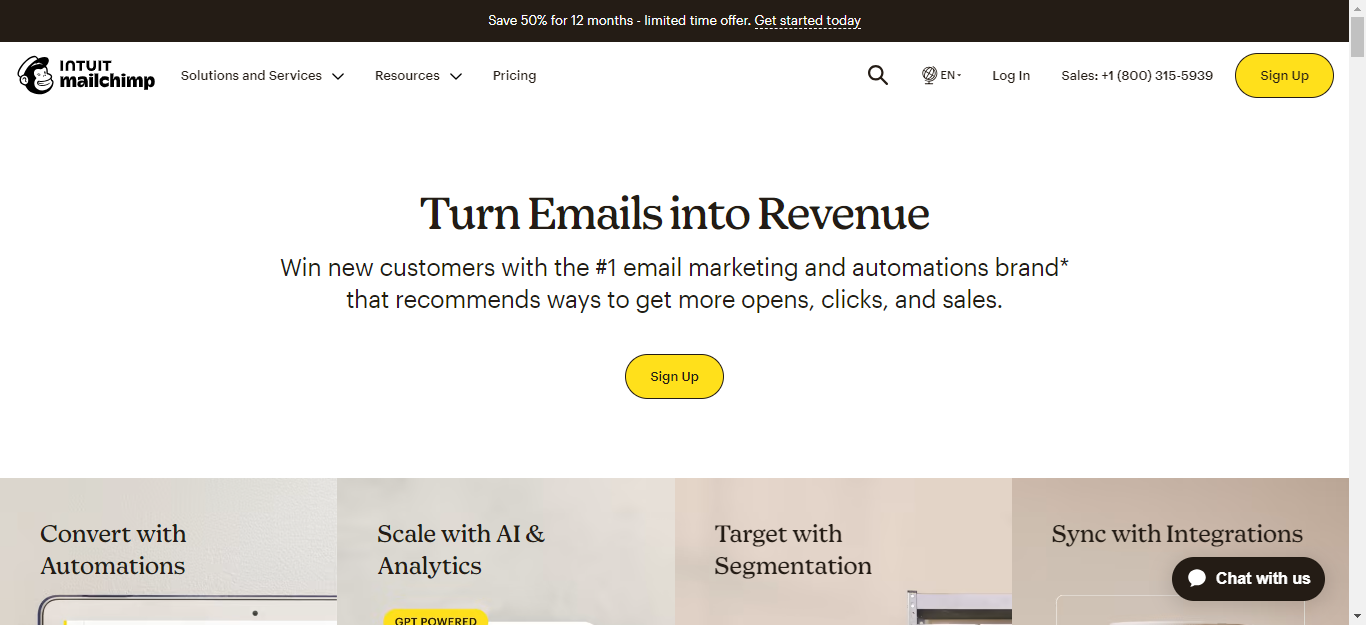
MailChimp is a popular and widely-used email marketing platform that enables businesses of all sizes to create, manage, and automate their email campaigns. With its user-friendly interface and comprehensive set of features, MailChimp has become a go-to solution for businesses looking to engage with their customers through effective email marketing strategies.
One of the key strengths of MailChimp is its intuitive email campaign builder, which allows users to design visually appealing and professional email templates without the need for extensive technical knowledge. Users can choose from a wide range of pre-designed templates or customize their own, ensuring that their email campaigns align with their brand identity. The platform also offers advanced automation features, allowing businesses to set up triggered emails based on customer actions or behaviors, such as welcome emails, abandoned cart reminders, or personalized follow-ups.
It also provides comprehensive audience management tools, making it easy for businesses to organize and segment their contact lists based on various criteria, such as demographics, purchase history, or engagement levels. This segmentation capability enables businesses to target specific groups of customers with personalized content and relevant offers, increasing the effectiveness of their email campaigns. Moreover, MailChimp offers robust analytics and reporting features, providing insights into email open rates, click-through rates, and other key metrics, allowing businesses to continuously optimize their campaigns for better results.
Businesses can also do integrations with various third-party applications in MailChimp, such as e-commerce platforms and social media platforms, enabling businesses to streamline their workflows and sync data seamlessly between different systems. With its user-friendly interface, powerful features, and versatility, MailChimp has become a popular choice for businesses looking to drive engagement, nurture customer relationships, and achieve their email marketing goals.
Key Features of MailChimp
- Email campaign builder
- Customizable email templates
- Audience management and segmentation
- Integration with third-party applications
- A/B testing
- RSS-to-email functionality
- Contact management and list building
Key Challenges with MailChimp
- Restrictions on certain features with lower-tier plans
- Potential deliverability issues
- Data syncing complexities with external platforms
- Reliance on third-party integrations for certain functionalities
- Occasional system glitches or technical issues
- Challenges in managing large subscriber lists
- Limited template design flexibility
- Compliance requirements and restrictions
9. Active Campaign
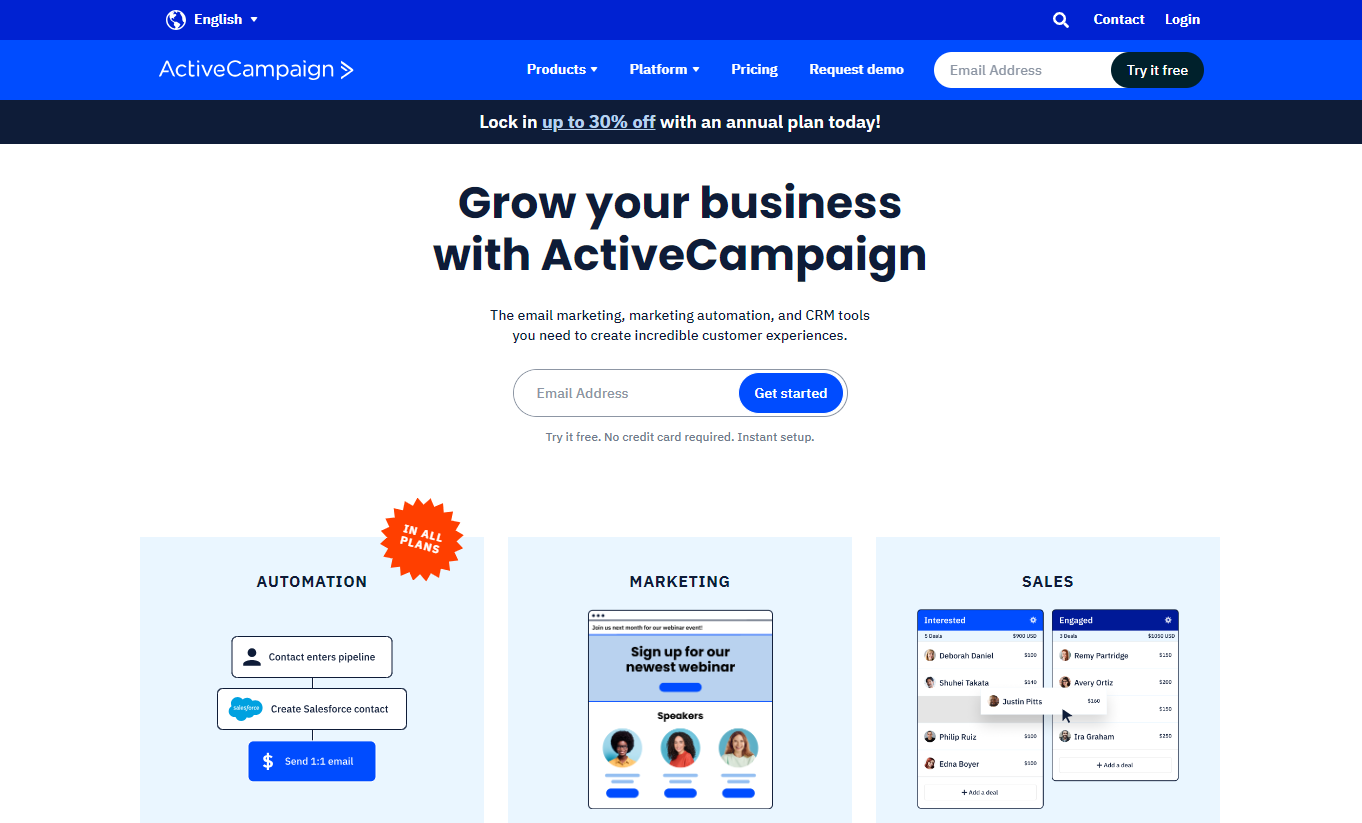
ActiveCampaign is a robust customer experience automation (CXA) platform that combines CRM and marketing automation capabilities. It provides businesses with a comprehensive suite of tools to effectively manage their customer interactions, automate marketing campaigns, and nurture leads throughout the customer journey. This software is designed to help businesses improve their customer engagement, boost conversions, and drive revenue growth.
ActiveCampaign allows users segment their audience based on various criteria, such as demographics, behaviors, or engagement levels, enabling targeted and personalized communication. Its marketing automation features empower businesses to automate repetitive tasks, send personalized email campaigns, and trigger actions based on customer behaviors or predefined conditions.
It also offers a visual automation builder that enables users to create complex workflows and automation sequences without the need for extensive coding knowledge. The platform provides advanced features like lead scoring, predictive analytics, split testing, and SMS marketing, allowing businesses to optimize their campaigns and improve their overall marketing performance.
Key Features of MailChimp
- CRM functionality
- Email marketing automation
- Contact management and segmentation
- Visual automation builder
- Lead scoring
- SMS marketing
- Third-party integrations
Key Challenges with ActiveCampaign
- Pricing may be considered high for some businesses
- Limitations in the design flexibility of email templates
- Complexity in setting up and managing advanced automation workflows
- Potential for deliverability issues
- Data syncing complexities with external platforms
- Difficulty in managing large contact lists or databases
10. SalesMate
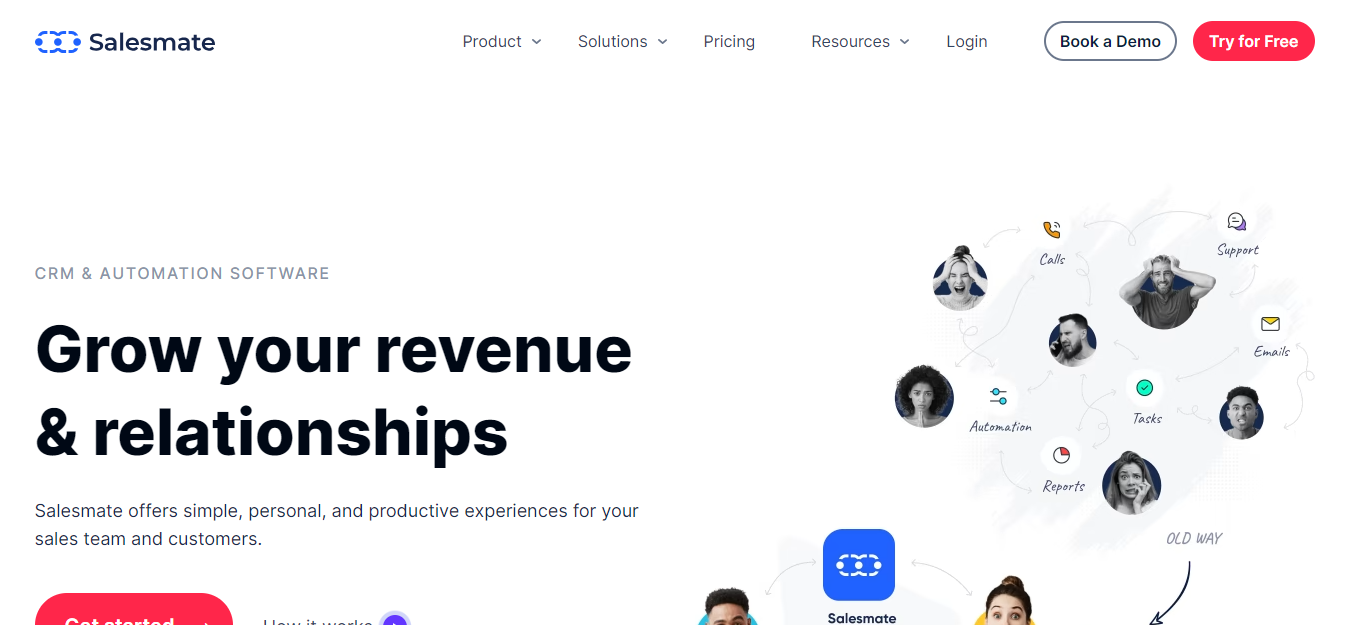
SalesMate is a versatile and user-friendly Best CRM Software designed to streamline sales processes, enhance customer relationships, and drive business growth. It offers a comprehensive set of tools and features that enable businesses to manage their sales pipeline, track customer interactions, and automate sales tasks. SalesMate is a valuable solution for sales teams and professionals looking to improve their efficiency and effectiveness in closing deals.
One of the key strengths of SalesMate is its intuitive and customizable sales pipeline management. Users can easily visualize and track their sales opportunities at various stages, enabling them to prioritize leads, follow up on prospects, and forecast revenue. The platform also offers features like contact management, activity tracking, and deal management, allowing sales teams to stay organized and focused on driving conversions.
It simplifies lead nurturing and engagement through its automation capabilities. Users can automate repetitive tasks, such as sending personalized email campaigns, setting reminders, or triggering actions based on customer behaviors. This automation helps save time and ensures consistent and timely communication with prospects, leading to increased engagement and higher conversion rates.
SalesMate also provides insightful analytics and reporting features that offer valuable insights into sales performance and customer behavior. Users can generate customizable reports, track key performance indicators (KPIs), and identify areas for improvement. Additionally, SalesMate offers integrations with popular third-party applications, including email clients, calendars, and marketing tools, enabling seamless data synchronization and workflow optimization.
Key Features of SalesMate
- Streamlined sales pipeline management
- Improved lead nurturing and engagement
- Automation of repetitive sales tasks
- Increased sales efficiency and effectiveness
- Improved customer relationship management
- Enhanced collaboration among sales teams
- Accurate sales forecasting
- Time-saving automation features
Key Challenges with SalesMate
- Potential for data syncing issues with external platforms
- Occasional system glitches or technical issues
- Dependency on third-party integrations for certain functionalities
- Complexity in setting up and managing advanced automation workflows
- Potential limitations in scalability for larger organizations
- Potential for limited industry-specific features or templates
- Compliance requirements and restrictions
How Much Does Best CRM Software in 2023 Cost?
The cost of CRM software can vary significantly depending on various factors, such as the size of the business, the specific needs and requirements, and the CRM vendor or provider. CRM pricing models typically fall into a few common categories:
- Subscription-Based: Many CRM solutions offer subscription-based pricing models, where businesses pay a recurring fee on a monthly or annual basis. The subscription cost can vary based on factors such as the number of users, the features included, and the level of customer support.
- Tiered Pricing: Some CRM providers offer tiered pricing plans, with different levels of features and capabilities available at different price points. These plans often provide flexibility for businesses to choose the option that best suits their needs and budget.
- Custom Pricing: In some cases, particularly for larger enterprises or businesses with unique requirements, CRM providers may offer custom pricing. This allows for tailored solutions and pricing structures based on the specific needs and scale of the business.
It’s important to note that CRM costs can go beyond the software itself. Additional costs may include implementation or setup fees, data migration, training and support, integration with other systems, and any necessary hardware or infrastructure upgrades.
The actual cost of Best CRM Software can vary significantly, ranging from affordable options for small businesses to more expensive enterprise-grade solutions. It’s recommended for businesses to carefully assess their needs, evaluate different CRM providers, consider the features and functionalities required, and compare pricing options to find the best fit within their budget.
Essential Best CRM Software in 2023 Features to Consider When Choosing the Right Software for Your Business Needs
When evaluating CRM systems to serve your business’s needs, there are several common features that you should consider. These features can help streamline your sales processes, improve customer relationships, and enhance overall productivity. Here are some key features to look for:
- Contact Management: The CRM should provide a centralized database to store and manage customer and prospect information, including contact details, communication history, and interactions.
- Sales Pipeline Management: Look for features that allow you to track and manage leads and opportunities through various stages of the sales pipeline, providing visibility into the status of each deal.
- Email Integration: Integration with email platforms allows you to manage and track email communications within the CRM system, enabling a complete view of interactions with customers.
- Task and Activity Management: The CRM should support the creation and tracking of tasks, appointments, and activities, ensuring efficient follow-ups and reminders for both sales and customer service teams.
- Automation and Workflow Management: Look for automation features that can streamline repetitive tasks, automate email campaigns, and trigger actions based on predefined rules or customer behaviors.
- Marketing Automation: A CRM solution should offer marketing automation capabilities, allowing you to create and automate targeted marketing campaigns, nurture leads, and track campaign performance. Features like email marketing automation, lead scoring, and segmentation can greatly enhance your marketing efforts.
- Landing Page Builder: Consider CRM systems that include a landing page builder, enabling you to create and customize landing pages for specific marketing campaigns. This feature helps capture leads and drive conversions by designing visually appealing and optimized landing pages.
- Billing and Invoice Automation: If streamlining your billing and invoice processes is important, seek CRM systems that offer billing and invoice automation features. This allows for automated generation, tracking, and management of invoices and payments, reducing manual administrative tasks.
- Booking and Appointments: Some CRM systems provide tools for managing bookings and appointments. This feature can be useful for businesses that require scheduling services, consultations, or meetings with clients, allowing customers to book appointments directly through the CRM system.
By assessing these features and aligning them with your business’s unique needs, you can identify the CRM system that best suits your requirements and helps drive your sales and customer relationship management processes effectively. It’s always better to choose all-in-one Best CRM Software as it provides a unified platform for managing customer relationships, sales processes, marketing campaigns, and other related activities. It eliminates the need for multiple software tools, improves efficiency, and promotes seamless collaboration across different functions, leading to enhanced productivity and streamlined operations.
How to Choose the Right Best CRM Software in 2023 for Your Business?
Choosing the right Best CRM Software for your business needs involves a systematic approach. Here are the steps to help you in the process:
1. Identify the specific requirements and challenges your business faces. Determine what functionalities and features are essential for your Best CRM Software to address those needs effectively.
2. Determine the budget you can allocate for Best CRM Software. Consider factors such as subscription costs, implementation fees, training, and ongoing support expenses.
3. Explore different CRM providers in the market. Evaluate their reputation, customer reviews, and industry expertise. Shortlist vendors that align with your business requirements and have a track record of delivering reliable CRM solutions.
4. Identify the critical features your business needs from a CRM system. This could include contact management, sales pipeline tracking, automation capabilities, reporting, integration options, and more.
5. Assess the scalability of the Best CRM Software to accommodate your business growth. Ensure the CRM can handle an increasing volume of data, users, and customer interactions as your business expands.
6. Request demos or free trials from shortlisted CRM providers. This allows you to explore the user interface, test functionalities, and assess ease of use. Evaluate how well the CRM software aligns with your specific workflows.
7. Consider the CRM’s ability to integrate with other essential business tools you currently use or plan to use in the future. Seamless data synchronization and connectivity are crucial for efficient operations.
8. Assess the level of customer support provided by the CRM vendor. Consider the availability of resources such as documentation, training materials, and support channels to ensure prompt assistance when needed.
9. Determine if the Best CRM Software offers customization options to adapt to your unique business processes. Look for flexibility in creating custom fields, workflows, and reports.
10. Evaluate all the factors mentioned above and select the Best CRM Software that best fits your business requirements, budget, scalability needs, and usability. Prioritize the CRM solution that offers the most value for your specific business needs.
By following these steps, you can make an informed decision and choose the Best CRM software that aligns with your business objectives, streamlines operations, and enhances customer relationships.